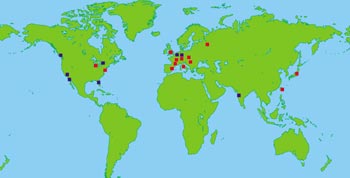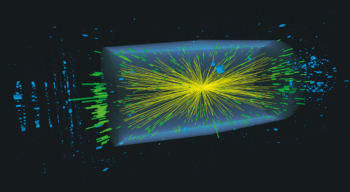
This summer the IT division at CERN was a hive of activity as dozens of young software engineers worked round the clock to launch the LHC (Large Hadron Collider) Computing Grid (LCG) into its first phase of operations. Meanwhile, similar hectic preparations were going on at other major computing centres around the world. The LCG project, which was launched last year, has a mission to integrate thousands of computers worldwide into a global computing resource. This technological tour de force will rely on novel Grid software, called middleware, and will also benefit from new hardware developments in the IT industry.
The challenge facing the LCG project can be summarized in terms of two large numbers. The LHC will produce more than 10 petabytes of data a year – the equivalent of a stack of CDs 20 km high – and require around 100,000 of today’s PCs to analyse that data. Behind the numbers, however, is a new philosophy. The data and processing power should be available to the thousands of scientists involved in LHC experiments in a completely seamless fashion, independent of their location. This is the philosophy of computer Grids, which take their name from the ubiquitous, highly reliable electricity grid with its plug-in-the-wall simplicity.
The LCG project has been rapidly gearing up for this challenge, with more than 50 computer scientists and engineers from partner centres around the world joining the effort over the past year. The first version of the LCG, called LCG-1, is now up and running on a restricted number of sites (see map) and with limited functionality. Over the next few years, however, the plan is for the LCG to grow in size and complexity, absorbing new Grid technologies and integrating many more sites.
…while the EGEE gets ready
The success of the European Union (EU)-funded European Data-Grid (EDG) project – a three-year effort led by CERN, which is due to finish in spring 2004 – has generated strong support for a follow-up project. The objective is to build a permanent European Grid infrastructure that can serve a broad spectrum of applications reliably and continuously. Providing such a service will require a much larger effort than setting up the current EDG test bed. So CERN has established a pan-European consortium called Enabling Grids for E-science in Europe (EGEE) to build and operate such a production Grid infrastructure, providing round-the-clock Grid service to scientists throughout Europe.
A proposal for such a project was submitted to the EU 6th Framework Programme in May 2003, where some €50 million has been earmarked by the commission for major Grid infrastructure projects. This proposal, again led by CERN, involves some 70 partners, encompassing all major computer centres in Europe as well as leading American and Russian centres. EGEE, following a positive evaluation by EU independent experts, has been invited to negotiate a contract with the EU for the major part of the allocated funds. Final contract negotiations with the EU are planned for November, and if all goes well the project should get under way by next spring.
The LHC Computing Grid will provide the springboard for EGEE, and in turn benefit from Grid software engineering that is part of the EGEE project. However, the mission of EGEE is also to extend the potential benefits of a Grid infrastructure beyond high-energy physics. The first target is biomedical applications, with other scientific and technological fields not far behind.
European projects galore
EDG and EGEE are by no means the only Grid projects that involve CERN. For example, DataTAG aims to provide high-speed connections between Grids in Europe and the US. In May, the project set its latest land-speed record, transferring data at nearly 1 Gbit/s (equivalent to nearly two DVD films a minute) between CERN and Chicago using the new IPv6 Internet protocol.
CrossGrid aims to extend the functionality of the EDG to advanced applications such as real-time simulations. The GRACE project is developing a decentralized search engine based on Grid technology. MammoGrid is dedicated to building a Grid for hospitals to share and analyse mammograms to improve breast-cancer treatment. GridStart aims to co-ordinate the efforts of the major Grid initiatives in Europe and disseminate information about the benefits of Grid technology to industry and society.





